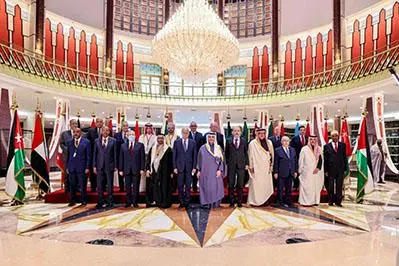PHOTO
There are major geopolitical changes happening in the Middle East. Even though these changes have implications for regional stability and security, few US policymakers are even aware they are taking place.
The Biden administration has shown an unwillingness to pursue a proactive foreign policy. As seen with the debacle in Afghanistan last year and the current crisis in Ukraine, the White House pays little attention to anything other than the crisis of the day. The main focus of the Biden administration is on pushing an increasingly controversial domestic agenda. Foreign policy is considered a distraction.
When it comes to the Middle East, what little focus is placed on the region is done almost exclusively in the context of securing a new nuclear deal with Iran. Neither President Joe Biden nor Vice President Kamala Harris has set foot in the region after more than a year in office. Phone calls between the Oval Office and regional leaders are few and far between. US policy in Syria is rudderless and the desperation to secure a new deal with Tehran has meant that the administration is turning a blind eye to Iranian aggression.
This lack of US focus on the region is concerning. There are significant changes happening in the Middle East that could benefit the country if American policymakers became more engaged. First and foremost is the continued success of the Abraham Accords.
Israeli President Isaac Herzog’s recent historic trip to the UAE marked a new chapter in Israeli-Arab relations. Not only was this the first time an Israeli president had visited the UAE, but the Israeli national anthem was also played in the UAE’s presidential palace. This would have been unthinkable just a couple of years ago.
In the early days of the Biden administration, many officials refused to use the term “Abraham Accords.” The historic diplomatic breakthrough that resulted in the UAE, Bahrain, Sudan and Morocco agreeing to establish diplomatic relations with Israel was perhaps one of the greatest foreign policy accomplishments of the Trump administration — and, as a consequence, the new president wanted nothing to do with it.
Now, however, there has been an acceptance by the administration that the accords are good for the region and good for peace. Even so, little effort has been made by the Biden administration to expand the Abraham Accords and bring in new members to the agreement. This is a missed opportunity.
Another major change taking place is the rapprochement between Turkey, the UAE and Saudi Arabia.
On the diplomatic front, Turkish President Recep Tayyip Erdogan is on a charm offensive. After many years of friction in Ankara’s relations with Riyadh and Abu Dhabi, things are starting to change. Last November, Abu Dhabi Crown Prince Sheikh Mohammed bin Zayed Al-Nahyan visited Ankara. Later this month, Erdogan will pay a visit to the UAE. It has also been reported in the Turkish press that Erdogan will visit Saudi Arabia on the same trip.
The impact of the Turkish rapprochement with the UAE and Saudi Arabia cannot be understated. All sides would benefit from increased economic trade, but especially Ankara, which is facing mounting economic problems. The UAE is also interested in procuring Turkish defense equipment. Turkey’s defense industry has experienced a recent boom due to the success of its equipment on the battlefield.
But the impact of improved relations between Ankara, Riyadh and Abu Dhabi will also be felt beyond the Gulf region. In recent years, Turkey has found itself on the opposite side of Saudi Arabia and the UAE’s positions in places like Somalia and Libya. If these three countries could work more closely together, it could help stabilize these situations.
Turkish engagement in the Middle East has not been limited to Arab states. There have been some positive developments between Turkey and Israel too. These two countries used to enjoy very close and strategic relations. However, in recent years, the relationship has deteriorated to perhaps its lowest point. Ankara has often criticized Tel Aviv’s approach to Palestine. Conversely, Israel criticized the perceived coziness between Turkey and Hamas. Thankfully, there are signs of a thaw in the relationship.
Herzog is expected to visit Turkey next month. Top of the agenda will be energy cooperation and economic relations. Behind closed doors, the traditional issues of Palestine and Hamas will also feature. It is not quite clear why the two sides are willing to meet now. It is reasonable to assume that Turkey’s close partner, Azerbaijan, which also enjoys a very close relationship with Israel, has supported the idea of a Turkish-Israeli rapprochement behind the scenes.
Thanks to economic necessity and a dose of realpolitik, a geopolitical transformation is taking place. Turkish-Arab rapprochement is on the table. There has been a thaw in Turkish-Israeli relations. Just a few months ago, these geopolitical changes would have been inconceivable.
Perhaps most extraordinary is that it is all happening without the US playing its traditional leadership role in the region. Paradoxically, these geopolitical changes could very well be happening because the US is not involved in the region. In the absence of American influence, regional countries realize they are alone in facing challenges and threats.
How, or even if, the Biden administration will start responding to these changes remains to be seen. But few can deny that these recent events are nothing but positive.
- Luke Coffey is the director of the Douglas and Sarah Allison Center for Foreign Policy at the Heritage Foundation. Twitter: @LukeDCoffey
Copyright: Arab News © 2022 All rights reserved. Provided by SyndiGate Media Inc. (Syndigate.info).





















